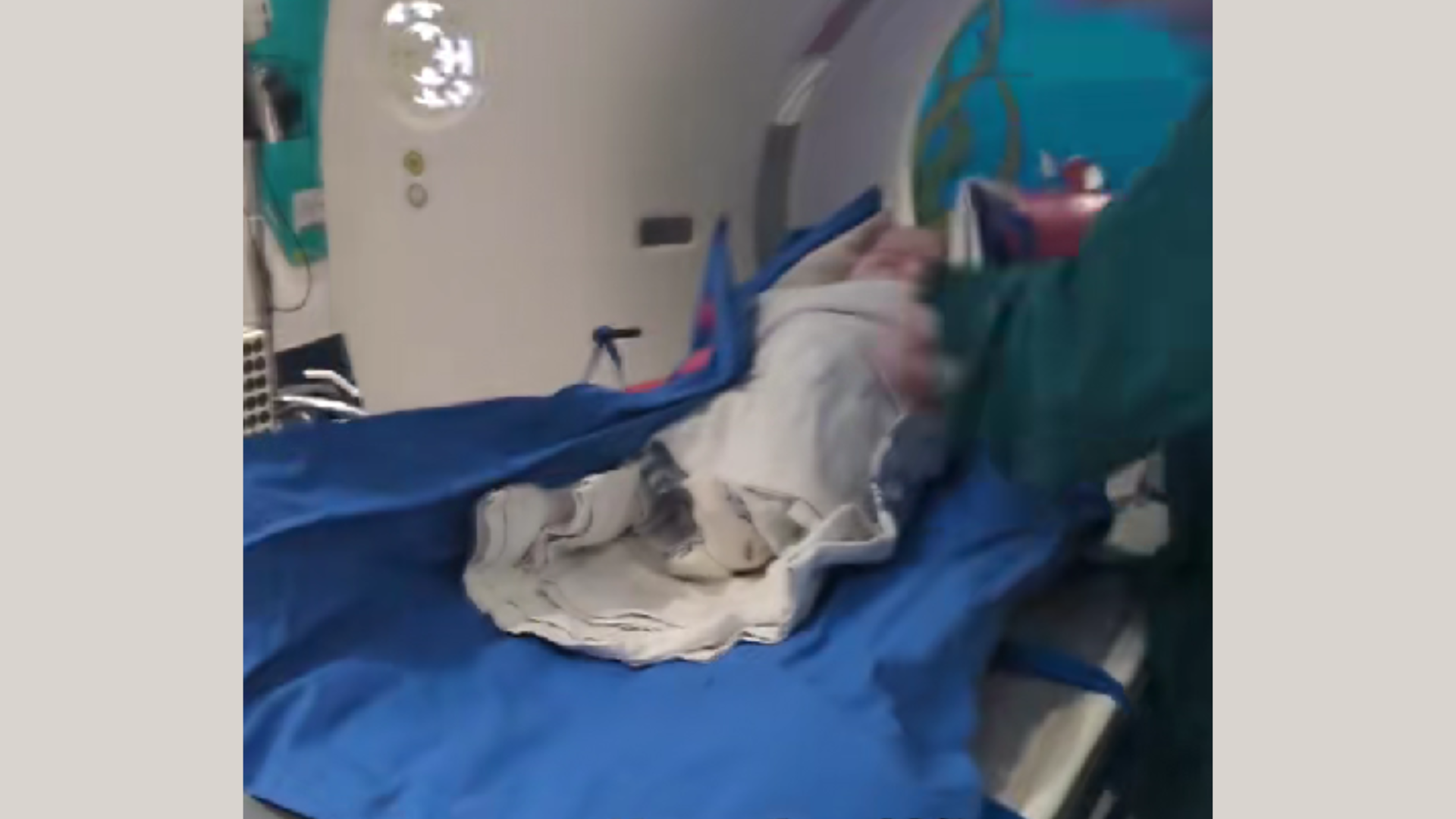Why Your Child Is Bloated
:max_bytes(150000):strip_icc()/GettyImages-1440927599-7886721361d54f3692da5de5ad776a99.jpg)
It’s common for grown-ups to gripe about bloating after salty meals or during their time of the month, but young children can get bloated, too. If your baby, toddler, or preschooler has a little round tummy, you may wonder whether they have a normal potbelly or an uncomfortably distended abdomen.
“Kids don’t have the language to describe it as bloating,” says Tamara Duker Freuman, RD, an expert in digestive health and the author of The Bloated Belly Whisperer. “They’ll say they have a tummy ache or that their stomach hurts.”
If your child’s stomach looks rounded, swollen, or puffy and feels hard to the touch, consider one of these possible causes of bloating in kids along with expert-approved ideas for easing the symptoms.
ozgurcankaya / Getty Images
Normal Belly vs. Distended Belly
It’s normal for older babies and toddlers to have potbellies as their abdominal wall muscles continue to develop. It’s especially common to see a baby, toddler, or preschooler’s tummy stick out after a large feeding or meal. By the time they reach school age, their bellies will be more proportional to the rest of their bodies.
But sometimes a young child has a bloated or distended belly that’s caused by a digestive issue. Here are some signs your baby or toddler’s round belly may be causing them discomfort:
- Their stomach feels hard to the touch
- They have not had a bowel movement for more than one or two days
- They are vomiting
- They are passing gas more frequently
“It’s normal and expected to pass gas six to 20 times a day. However, when this frequency increases and we see their abdomen full and distended, it’s very likely they are bloated,” says Betsabe Petit, MD, a board-certified pediatrician in Houston.
Causes of Bloating in Babies, Toddlers, and Older Kids
Abdominal distension and bloating can have several different causes in babies and young children. Here, we talk about five common reasons for bloating in kids, plus ways to ease their discomfort.
Your child is swallowing air
Swallowing extra air, called aerophagia, can cause a few unpleasant problems for the gastrointestinal tract. Children who swallow excess air may excessively burp or pass gas, have a gurgly tummy, or feel belly pain.
Crying excessively or eating too fast may cause aerophagia. Some kids have a nervous habit of swallowing extra air when they’re anxious or worried, says Freuman. Older children may gulp extra air if they’re chewing gum, sucking on hard candies, or drinking carbonated beverages.
Here is how to help your child with aerophagia:
- Try giving them over-the-counter simethicone: Babies can take gas drops while older children may be able to swallow small capsules. “Simethicone dissolves gas bubbles and prevents gas pockets in the intestine and stomach,” says Dr. Petit. “Avoid simethicone that contains sodium benzoate or benzoic acid.”
- Teach older children deep breathing techniques: Deep breathing exercises can help modulate their breathing style so they don’t take in gulps of air.
Your child is constipated
Constipation is a huge problem among kids but often goes unnoticed by parents. One common trigger: Kids may withhold because they don’t feel comfortable using the bathroom at school (or, for younger kids, are resisting potty training). That can lead to painful bowel movements, constipation, and a hard, bloated belly.
Here is how to help your child with constipation:
- Make sure they are hydrated: Babies, toddlers, and older children need adequate fluids throughout the day, and more during hot weather and heavy physical activity.
- Feed toddlers and older children more fiber: High-fiber foods include whole grains, berries, and peas.
- Keep them physically active: Movement and playing can help food move through the intestines more efficiently.
- Stick to an eating routine: Regular meals can help create a bathroom schedule naturally if they are withholding bowel movements.
Kids with chronic constipation should be seen by a pediatrician or gastrointestinal (GI) doctor. “If the stools are hard to pass, infrequent, or if the child is able to clog a toilet, talk to your pediatrician,” adds Dr. Petit.
Your child has a food intolerance or sensitivity
According to Dr. Petit, one of the most common causes of bloating in kids is excessive intestinal gas caused by food allergies or intolerances.
A common culprit is lactose, the natural sugar in milk. The onset of lactose intolerance typically occurs during childhood or adolescence, according to the American Academy of Pediatrics (AAP). Other kids are intolerant or sensitive to proteins like gluten or casein.
Here is how to help your child with a possible food intolerance or sensitivity:
- Keep a food journal: A food intolerance can be tricky to pinpoint since the symptoms—including bloating, gas, and diarrhea—may not appear until six to 10 hours after eating. For instance, the milk your child had at breakfast may not bother them until dinnertime, says Freuman. The biggest culprits for lactose intolerance are dairy foods like milk, cheese, and yogurt.
- Talk to your child’s pediatrician: A doctor may suggest eliminating dairy or another suspected culprit from their diet before gradually adding them back and chronicling the results. They might also conduct a hydrogen breath test, which detects hydrogen in your child’s breath before and after they consume lactose.
Your child has trouble digesting certain foods
Your child may eat a lot of foods that commonly cause gas. Fructose (naturally found in many fruits and veggies), fatty foods, beans, cruciferous vegetables (such as broccoli, Brussels sprouts, and cauliflower), and artificial sweeteners like sorbitol can tax the digestive system, leading to bloating and gas.
Here is how to help your child who may have trouble digesting certain foods:
- Introduce fruits and veggies one by one: As you slowly add new foods to your baby’s diet, keep a food diary to monitor the reaction. “Once you determine which food triggers your child’s abdominal distension, avoid those triggers,” Dr. Peiti says.
- Teach your child to thoroughly chew their food: Chewing can help break down fibrous foods and better aid digestion.
- Give your child water instead of juice: Along with reducing gassiness commonly caused by fructose or artificial sweeteners, this switch can lead to healthier teeth and blood sugar levels.
“Be mindful that fruit juice, carbonated beverages, candies, or chewing gum may produce abdominal distension,” Dr. Peiti adds.
Your child has irritable bowel syndrome (IBS)
Irritable bowel syndrome (IBS) is often considered an adult condition. But many people with IBS had symptoms as children, says Freuman. Some kid-friendly foods, such as milk, fruits high in fructose, processed snacks, and chocolate, are common triggers for IBS-related constipation or diarrhea.
Common signs of IBS in kids can include:
- Change in bowel habits
- Diarrhea and/or constipation
- Chronic tummy aches
- Bloating, gas, and nausea
- Urgency when needing to have a bowel movement
- Feeling of incomplete bowel movements
- Mucus in stool
- Dizziness
- Loss of appetite
Here is how to help your child who may have IBS:
- Talk to your child’s pediatrician: A pediatric health care provider can conduct an evaluation or refer you to a specialist.
- Work with a dietitian: A registered dietician can help you figure out food changes that can ease symptoms. It may be as simple as adding more fiber to your child’s diet. Your provider might recommend foods low in FODMAPs (fermentable oligosaccharides, disaccharides, monosaccharides, and polyols) to reduce IBS symptoms.
When To See a Health Care Provider
A large, rounded belly is common in babies and young kids. If your child’s belly is soft between feedings and meals and not tender to the touch and they don’t show any other symptoms of illness or discomfort, there is probably nothing to worry about.
In other cases, you might be dealing with bloating. Although bloating is uncomfortable, it’s rarely serious. That said, you should seek medical help right away if your child has a distended belly and any of the following:
- Is younger than 3 months and has diarrhea or vomiting
- Is being treated for cancer
- Is unable to pass stool (especially if also vomiting)
- Is vomiting blood or has blood in the stool (especially if the blood is maroon or a dark, tarry black color)
- Has sudden, sharp abdominal pain
- Has a rigid, hard belly
- Has had a recent injury to the abdomen
- Is having trouble breathing
You should also consult a doctor if bloating happens regularly. “They can rule [out] other conditions such as celiac disease or inflammatory bowel disease,” says Dr. Petit.
link




:max_bytes(150000):strip_icc()/asian-sick-little-girl-lying-in-bed-with-a-high-fever-952683074-5b5b784046e0fb005027ca13.jpg)

